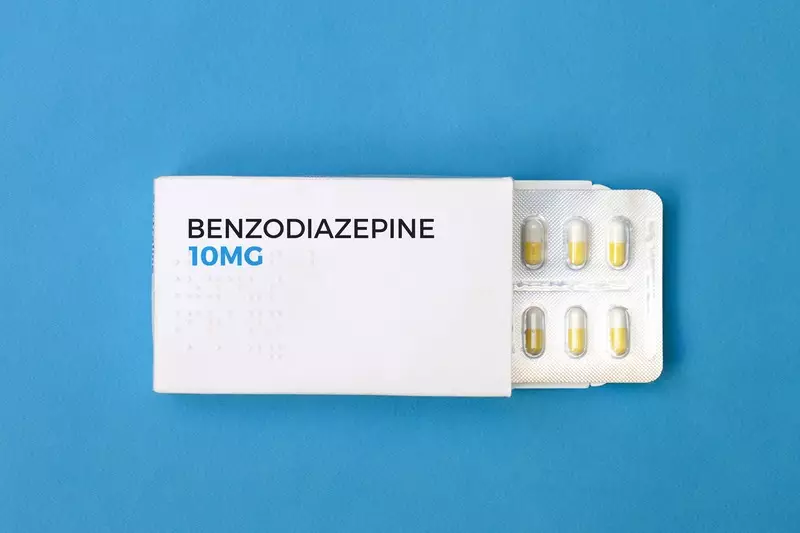What are Benzodiazepines?
Benzodiazepines, commonly referred to as benzos, are a classification of drugs used to treat a variety of legitimate health concerns. Doctors commonly prescribe benzos for anxiety, insomnia, or seizures. Benzos are typically safe for short-term use. However, you may become addicted to them after a while and find it difficult to stop taking them on your own. You could also become tolerant of benzos, meaning you require more of the medication to achieve the same effect.
Different Types of Benzodiazepines
Drug companies that manufacture benzos market them under several brand and generic names. These include:
- Ativan (lorazepam)
- Klonopin (clonazepam)
- Valium (diazepam)
- Versed (midazolam)
- Xanax (alprazolam)
Benzos work by altering neurons in the brain that trigger stress and anxiety reactions. Mixing any of these types of benzos with alcohol can have a fatal result.
How Benzodiazepine Addiction and Dependence Starts
The first indication that you have become physically dependent on benzos is when you experience adverse reactions upon stopping the drug. However, that does not mean you have reached the point of addiction. Common benzos withdrawal symptoms include:
- Anxiety
- Diarrhea or general stomach upset
- Difficulty concentrating
- Headaches
- Insomnia
- Muscle cramps
- Rapid breathing patterns
- Seizures
- Tremors
If you want to stop taking the drug and wonder how to get off benzos, the most effective strategy is to slowly reduce your dose over time. Be sure to work with your doctor while coming off benzos to avoid the unpleasant effects of stopping the drug too abruptly.
Addiction to benzos affects you on a physical and psychological level. If you are truly addicted, you will still struggle even after going through the detoxification process. Although the drug has left your body and you no longer have any of the above symptoms, it still maintains a psychological hold over you. Without benzodiazepine addiction treatment, you will continue to engage in drug-seeking behaviors despite knowing that long-term use of benzos can harm you.
The American Society of Addiction Medicine advises people to look for these symptoms and behaviors if they feel concerned that they or someone they love has become addicted to benzos:
- Obtaining benzos illegally or from multiple doctors
- Cravings for benzos and feeling preoccupied with obtaining or using them
- Misuse of benzos by mixing it with other drugs or alcohol for a pleasure effect rather than using it for the intended purpose
- Decreased motivation and productivity
- Problems in relationships
- Legal issues
Your risk of addiction to benzos is higher if you have a history of illicit drug use, alcoholism, or abusing other prescription drugs.
Treatment for Benzos Addiction
Benzos addiction treatment can require immediate action, a long-term solution, or both. People who have consumed too many pills in the benzos family should go to the nearest emergency room within an hour if possible. Medical personnel can perform gastric lavage, which is also known as stomach pumping. This procedure involves placing a tube in the mouth or nose that goes directly to the stomach and extracts the contents.
Other possible emergency treatments include activated charcoal and the prescription drug Romazicon. Emergency departments can administer activated charcoal within four hours of the benzos overdose to prevent the body from absorbing it. Romazicon, also known by its generic name flumazenil, is a treatment reserved for severe benzos poisoning. Doctors are cautious about using this drug because it can cause seizures and other serious symptoms in habitual benzos users.
If you or a loved one cannot stop taking benzos and are suffering negative consequences because of it, the next step is to locate a drug treatment program. These programs provide medical intervention and psychological counseling for people addicted to prescription drugs or street drugs.
Drug treatment can be either outpatient or inpatient. The benefit of an outpatient drug treatment program is that you can continue to work and attend the program around your schedule. However, inpatient treatment may be more appropriate if you have a severe physical and psychological dependence on the drug. The important thing is to seek help from a qualified, reputable drug treatment provider as soon as possible.
Looking for a guiding light to sobriety? Call or text (866) 971-5531 or fill out a form to speak with an expert in addiction treatment.
Sources
https://www.medicalnewstoday.com/articles/262809
https://www.drugabuse.gov/drug-topics/opioids/benzodiazepines-opioids
https://www.asam.org/
https://www.webmd.com/mental-health/addiction/benzodiazepine-abuse-treatment
Jump to a Section
Call (855) 425-4846
